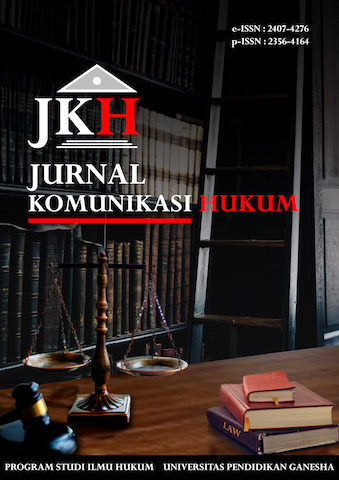FUNGSIONALISASI HUKUM SEBAGAI FONDASI BANGUNAN PERADABAN PERGURUAN TINGGI YANG ANTI KEKERASAN SEKSUAL
DOI:
https://doi.org/10.23887/jkh.v8i2.51573Abstract
The issuance of Regulation of the Minister of Education, Culture, Research, and Technology Number 30 of 2021 concerning the Prevention and Handling of Sexual Violence in Higher Education implies the issue of sexual violence in higher education that needs to be taken seriously. It is an irony that universities which are a reflection of the quality of humanity actually experience problems that attack the human rights of their community members. Efforts to tackle sexual violence in universities are rational because society's civilization is built on the foundation of a conducive academic climate. The next alternative path that can be taken is derived into a problem formulation about the extent to which the law is able to play its role in efforts to resolve the problem of sexual violence in universities. This study is aimed at analysis related to the functionalization of law and its consequences on the selection of certain legal fields, both administrative, civil, and criminal in overcoming sexual violence in universities. Through the juridical-normative method, this research was carried out using a statutory, case, and conceptual approach. Primary, secondary and tertiary legal materials were collected through literature study. Analysis of the legal materials that have been collected, selected, and systematized is carried out qualitatively and written in a descriptive-prescriptive manner. The results of the study show that efforts to build civilization for universities are parallel with respect for human rights. Coherently means that actions that are violations of human rights which in this case take the form of sexual violence must be handled properly. Law as a tool of social engineering becomes a very rational choice in addition to other social rules, namely decency, appropriateness, religion. Areas of law that can be applied include administrative, civil, and criminal law. Among the three fields of administrative law, it is the field of administrative law that needs to be put forward considering the character of criminal law which is ultimum remedium or a last resort when other efforts are not able to solve problems optimally. this is none other than because criminal law itself has limitations whose use causes negative excesses so that caution is required in its application.
Downloads
Published
How to Cite
Issue
Section
License
Authors who publish with this journal agree to the following terms:- Authors retain copyright and grant the journal right of first publication with the work simultaneously licensed under a Creative Commons Attribution License that allows others to share the work with an acknowledgement of the work's authorship and initial publication in this journal.
- Authors are able to enter into separate, additional contractual arrangements for the non-exclusive distribution of the journal's published version of the work (e.g., post it to an institutional repository or publish it in a book), with an acknowledgement of its initial publication in this journal.
- Authors are permitted and encouraged to post their work online (e.g., in institutional repositories or on their website) prior to and during the submission process, as it can lead to productive exchanges, as well as earlier and greater citation of published work (See The Effect of Open Access).
Authors who publish with this journal agree to the following terms:
- Authors retain copyright and grant the journal right of first publication, with the work [SPECIFY PERIOD OF TIME] after publication simultaneously licensed under aCreative Commons Attribution License that allows others to share the work with an acknowledgement of the work's authorship and initial publication in this journal.
- Authors are able to enter into separate, additional contractual arrangements for the non-exclusive distribution of the journal's published version of the work (e.g., post it to an institutional repository or publish it in a book), with an acknowledgement of its initial publication in this journal.
- Authors are permitted and encouraged to post their work online (e.g., in institutional repositories or on their website) prior to and during the submission process, as it can lead to productive exchanges, as well as earlier and greater citation of published work (See The Effect of Open Access).












